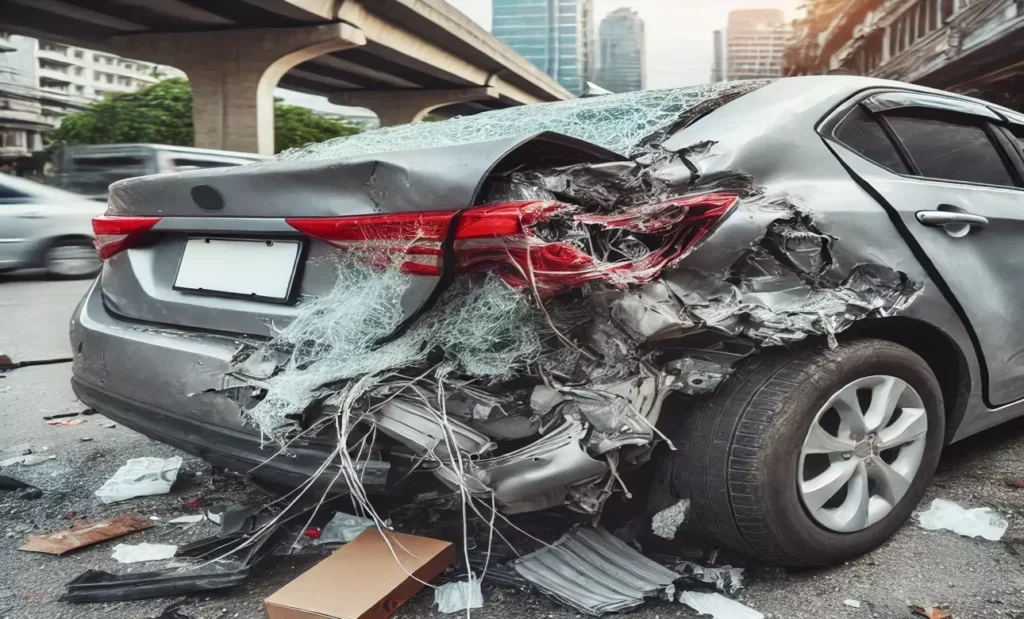Rear-End Car Accident Lawyer: Defending Your Rights After a Crash

Collisions involving the front of one vehicle striking the rear of another are frequently encountered on roadways. These incidents represent a significant portion of automotive mishaps. Such collisions frequently lead to substantial bodily injuries and complex juridical challenges. This article explores the role of lawyers specializing in rear-end car accidents, how they can help you secure the compensation you are entitled to, and why it’s crucial to understand the legal process. Being aware of your rights and the necessary steps is essential for effectively navigating the situation.
Grasping the Lawyer’s Role in Rear-End Car Accident Cases
A lawyer specializing in rear-end car accidents can be a valuable ally when dealing with the legal process. Their knowledge and skills help ensure that victims obtain the necessary support and achieve fair compensation for their damages and losses.
The Importance of Legal Representation
Why You Should Consider Hiring a Lawyer for Rear-End Car Accident Cases?
Rear-end car accident cases can be complicated. A proficient legal representative can craft a compelling argument by leveraging their extensive knowledge of judicial intricacies. They are also equipped to negotiate with insurance companies and represent you in court when needed.
Benefits of Hiring a Specialist
Choosing a specialist ensures that your lawyer has the expertise and experience needed to handle rear-end car accident cases effectively. This expertise can significantly enhance your chances of obtaining a favorable outcome.
Assessing Your Situation
Immediate Steps After a Rear-End Collision
Taking swift action is essential if you or someone else is involved in a rear-end collision. Follow these steps to move forward:
- Seeking immediate medical attention is important, even for injuries that seem minor. This protects your well-being and offers essential documentation for any legal proceedings.
- Report the Accident: Inform local law enforcement to ensure the incident is officially recorded.
- Gather Information: Gather information about the other motorist, their vehicle, and any bystanders.
Seeking Medical Attention
Prompt medical care is crucial to prevent complications and accurately document your injuries. This documentation is essential for progressing your current legal case.
Reporting the Accident
Reporting the accident to authorities helps create an official record. This can provide vital evidence for your case and contribute to preventing similar incidents in the future.
Legal Framework
Understanding Rear-End Collision Laws
Laws regarding rear-end collisions differ from state to state, but the rear driver is typically considered at fault. Grasping these regulatory frameworks proves vital when initiating legal proceedings.
Liability in Rear-End Accidents
Liability establishes who bears responsibility for the incident. Typically, the rear driver is considered at fault, but there are exceptions to this guideline.
Common Causes of Rear-End Collisions
- Distracted driving
- Speeding
- Tailgating
- Sudden stops
- Weather conditions
Building Your Case
Gathering Evidence
Building a solid case requires thorough evidence collection. This involves gathering medical records, photos of the accident scene, and other pertinent documents.
Documenting Injuries
Detailed documentation of your injuries is crucial. This involves medical reports, photos, and other evidence that demonstrate the severity of your injuries.
Witness Statements
Please keep in mind that witnesses are essential in bolstering your case. Their statements and contact information are crucial, as their testimony can greatly bolster your case.
Compensation and Damages
Types of Compensation Available
Individuals involved in rear-end collisions may qualify for various forms of compensation, including:
- Medical Expenses: Such compensation covers medical expenses spanning from immediate treatment to extended rehabilitation requirements.
- Pain and Suffering: This provides compensation for both physical suffering and emotional distress.
- Lost Wages and Future Earnings: If the injury hampers your ability to work, the policy compensates for missed income due to the injury and potential future income.
The Legal Process
Filing a Claim
Filing a claim involves submitting the necessary paperwork to initiate your case. Your lawyer will assist you in properly submitting all required documents. After the claim is submitted, investigation and bargaining with the insurance provider will ensue.
Should negotiations fail to yield a fair agreement, your attorney will begin preparations for presenting your case in court.
Negotiating with Insurance Companies
Insurance companies often try to minimize payouts. A seasoned legal representative can champion your interests to secure appropriate monetary restitution.
Settlement vs. Trial
The majority of rear-impact vehicle collision claims reach resolution through negotiated agreements outside the courtroom. Nevertheless, your legal representative stands prepared to pursue judicial proceedings should amicable settlement discussions prove unsuccessful.
Choosing the Right Lawyer
Experience and Specialization
When selecting a lawyer, take into account their experience and expertise in handling rear-end car accident cases. A lawyer with a demonstrated history of success in this field will be more capable of managing your case.
Questions to Ask a Potential Lawyer
- How much experience do you have with handling rear-end car accident cases?
- What is your success rate in these cases?
- How do you approach settlement negotiations?
Red Flags to Watch Out For
Be wary of lawyers who:
- Guarantee a specific outcome.
- Are unwilling to provide references.
- Have a history of disciplinary actions.
Common Costs of Hiring a Lawyer for Rear-End Car Accident Cases
When choosing a lawyer for a rear-end car accident case, it’s important to know the common fees and payment arrangements. Fees for legal counsel fluctuate considerably based on several factors, such as the complexity of proceedings, the advocate’s expertise level, and the region where services are rendered. Here’s a breakdown of the standard fee structures and associated costs:
1. Contingency Fees
Many lawyers specializing in rear-end vehicle collisions work on a contingency basis, receiving payment solely if you win your case. The typical contingency fee usually falls between 25% and 40% of the settlement or judgment total.
- Advantages: No upfront costs; the lawyer is motivated to win.
- Disadvantages: A significant portion of your settlement will go toward legal fees.
2. Hourly Rates
Some lawyers charge by the hour, depending on their experience and location. Time-based compensation for legal services typically spans from a modest $100 to a premium $500 per sixty-minute increment.
- Advantages: You pay for the actual time spent on your case.
- Disadvantages: Costs can add up quickly, and predicting the total expense takes more work.
3. Flat Fees
Your lawyers may sometimes offer a flat fee for specific services, like drafting a demand letter or filing certain documents. Flat fees offer cost predictability.
- Advantages: Clear, upfront pricing.
- Disadvantages: It might only cover certain parts of your case, resulting in extra charges.
4. Retainer Fees
Initial monetary deposits, known as advance fees, serve to establish and confirm professional legal representation. Professional service charges are subtracted from the advance deposit as your legal proceedings progress. Should the preliminary financial reserve become depleted, supplementary funding might be necessary to ensure continued representation.
- Advantages: Secures dedicated legal counsel’s commitment to handling your proceedings.
- Disadvantages: Requires a significant upfront payment.
5. Additional Costs
Legal representation expenses constitute just one component of the financial obligations typically incurred during rear-impact vehicle collision proceedings. These can include:
- Court Fees: Administrative costs for initiating legal proceedings and associated documentation charges.
- Expert Witness Fees: Expenses for medical experts, accident reconstruction specialists, and other professionals.
- Administrative Costs: Costs for tasks such as copying documents, postage, and other related administrative services.
- Travel Expenses: Your lawyer may need to travel for depositions or court hearings.
Example Breakdown of Costs
To give a clearer picture, below is a detailed breakdown of potential expenses:
- Contingency Fee: When monetary restitution reaches $50,000, the legal representative’s 33% portion would amount to $16,500.
- Court Fees: $500
- Expert Witness Fees: $2,000
- Administrative Costs: $300
- Travel Expenses: $200
Total Costs: $19,500. Following the deduction of professional fees and associated costs, your net compensation would equal $30,500 from the total restitution amount of $50,000.
Tips for Managing Legal Fees
- Discuss Fees Upfront: Talk about the fee structure and any possible extra expenses during your initial consultation.
- Get a Written Agreement: Ensure that all fee arrangements are documented in a written agreement.
- Ask About Payment Plans: Some attorneys might provide flexible payment options or installment plans.
- Negotiate Fees: Feel empowered to explore and deliberate compensation arrangements with your prospective legal representative. Some legal practitioners demonstrate flexibility in modifying their compensation arrangements.
- Monitor Costs: Keep track of all expenses and regularly review invoices to ensure no unexpected charges.
Understanding the typical costs associated with hiring a lawyer for a rear-end car accident can assist you in making an informed decision and effectively managing your legal expenses. Whether you choose a contingency fee structure, hourly rates, or flat fees, it’s essential to discuss all potential costs in advance and make sure everything is recorded. Such representation allows you to prioritize healing and rehabilitation while your legal counsel pursues appropriate monetary restitution on your behalf.
FAQs About Rear-End Car Accident Lawyers
What is the deadline for filing a claim?
The statute of limitations varies by state, generally falling within a range of one to three years.
What If the Other Driver Has No Insurance?
Legal action remains available to pursue monetary restitution from the responsible motorist.
Can I Sue for Emotional Distress?
Emotional distress is a valid claim in cases involving rear-end car accidents.
How Do No-Fault State Regulations Impact Rear-Impact Vehicle Incidents?
While your insurance might be a primary resource, consulting an attorney can provide valuable insights into alternative approaches you could consider.
What are the financial implications of engaging legal representation for a rear-impact vehicle collision case?
Numerous attorneys work under a contingency fee arrangement, meaning they receive payment only if your case is successful.
What Should I Bring to My First Consultation?
Provide necessary documents such as medical records, photos, and witness details.
What is the typical duration for reaching a resolution in rear-impact vehicle collision proceedings?
The duration varies, but cases can take several months to a few years to resolve.
Can an individual manage their rear-impact vehicle collision claim without professional legal assistance?
Although it’s possible, having a skilled lawyer greatly enhances your chances of obtaining a favorable outcome.
What If the Rear-End Collision Involves Multiple Vehicles?
Remember: Seeking legal counsel can provide valuable guidance when dealing with the complexities of crashes involving multiple vehicles.
What factors determine the likelihood of a favorable outcome in rear-impact vehicle collision litigation?
Your likelihood of achieving a favorable outcome hinges upon the particular circumstances surrounding your incident and the documented proof at your disposal.
Conclusion
Rear-end car accident injuries can have long-lasting effects. Engaging professional legal counsel safeguards your entitlements and maximizes your potential for appropriate monetary restitution. Promptly address any physical harm sustained in rear-impact vehicle collisions. Contact a legal professional who focuses on rear-impact vehicle incidents to evaluate your situation and initiate steps toward rightful recompense.






